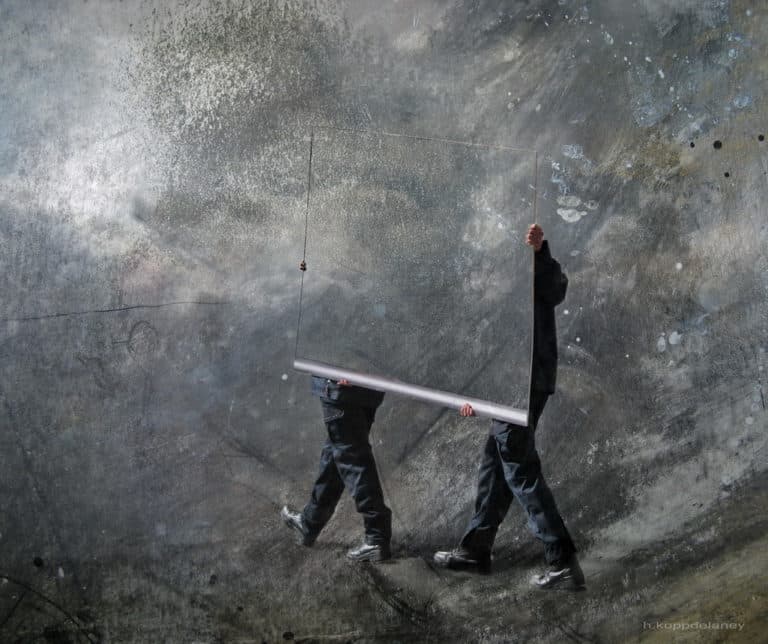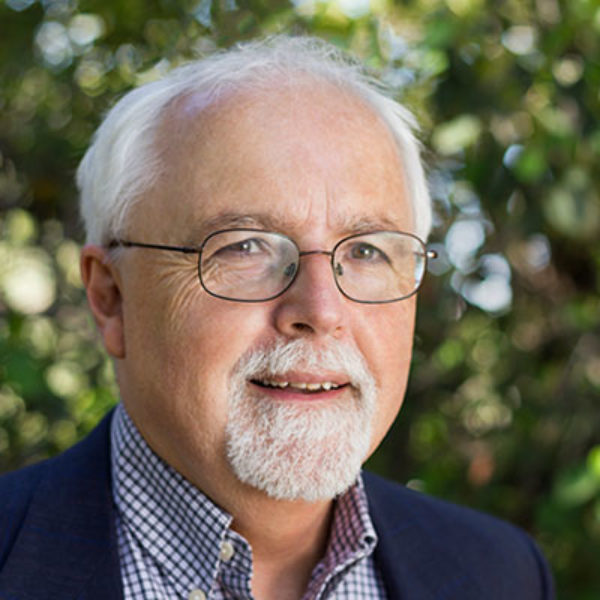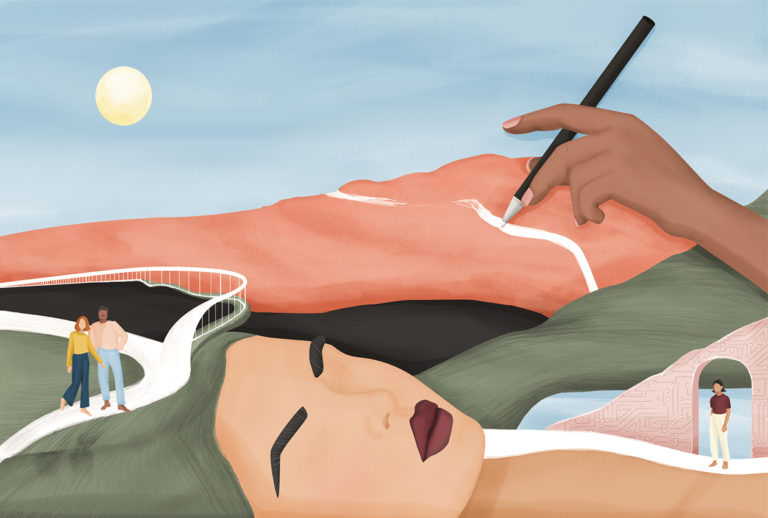
Image by Hartwig HKD.
A Unified Field Theory of the Interior Life
“Everything rests on a few ideas that are fearsome and cannot be looked at directly.” —Paul Valery
Sydney Banks (1931–2009) was a Scottish welder who had a mystical experience in 1973. He wrote a few books about his spiritual revelations and gave lecturers. More importantly, he transformed the lives of a cadre of “post-therapy” psychotherapists who recast his ideas under variety of names, most notably “Health Restoration Therapy” and “The Psychology of Mind.”
Banks’ ideas are currently experiencing a new resurgence under the moniker “The Three Principles.” Put simply, “The Three Principles” are a way of looking at the relationship between mind, thought, and consciousness that offers a kind of unified field theory of the interior life. Human beings are experience-generating animals, but the individual experiences we generate are the product of thoughts. It is our thoughts that shape the formless unknown into meaningful events and images. This is both a useful and disorienting thing since the process of human thinking takes us away from the limitless potential of absolute reality for the sake of a single, limited event or interpretation.
As a result each one of us lives in small, separate, psychological worlds of our own making. The problem is that we innocently believe that these worlds are outside of us, shaping our lives, when they are actually created from the inside out. When we move more deeply into these little worlds by thinking, we move even further from reality (limitless potential) into various narrow, imagined roles, needs, and identities.
This is really not something we can overcome. Human beings, by nature, must give up consciousness to engage in tasks and projects, and so end up innocently assuming their perceptions reflect reality when they are almost always and inevitably what the psychologists call projections.
We take our moods and insecurities as directives to think harder or take even more control over our lives — lives which we have already cut down to fit our small, particular culture-bound ambitions. The better road to mental health and happiness is to see these uncomfortable feelings as a signal to question our beliefs in order to rise to a higher level of consciousness.
According to Banks, our insecure feelings and anxious perceptions are always the product of emotionally driven ego states. In order to experience the deep security and peace of mind innate to every human being, we need only take our personal thoughts less seriously which, in turn, opens our minds up to natural contemplation and present-mindedness.
As human beings, we don’t know we have chosen such limited awareness or made habits of our fears, anxieties, and addictions until someone points this out to us because it seems so natural to be perpetually stressed and unhappy. It is only when something breaks through the complacency of our everyday lives — an illness maybe or a death in the family, great love or exceptional beauty — that we see through our false selves and limited worlds. Until this happens, we continue to blame our feelings of futility on the human condition. In fact, until we wake up from ordinary everyday despair, we will continue to imagine that all our problems are coming at us from the outside world and not through us via our own thoughts, ideas, and assumptions.
This is the “innocent” mistake all human beings make: forgetting that we are experiencing our thinking and taking our thinking for reality, and it takes a rebirth of innocence to overcome this convincing illusion.
Many of us, it turns out, are relatively high-functioning depressives suffering from general anxiety disorder and don’t even know it. And yet once we wake up to the fact that there is another part of us that sees through the roles we play and the thoughts we have, a formless consciousness peeking out at the world through a limited meat-spirit overlay conditioned and hypnotized by a conspiracy of illusions — we find our lives instantly transformed and return to our “normal” state of natural contemplation and psychological health.
Suddenly the hope we may have talked ourselves out ten years earlier returns as an antidote to a self-inflicted despair. Or the dark thoughts we once worshiped shrink down to human size as we now realize how limited they are.
All human thoughts — even the thoughts of our so-called geniuses — are mere moments in the eternal, formless scheme of things. Once we see how we are situated with respect to thought, mind, and consciousness, we begin to appreciate — perhaps for the very first time — our own originality and existential uniqueness. We begin to see the ignorant perfection of ourselves as ordinary people whose ideas are just as limited contingent as those of Kant and Hegel, but whose souls are just a limitless and large.

Luckily, as God and or as nature would have it, our feelings of alienation drive us to seek out a sense of true being to replace our limited thinking. This intuition of a transcendent absolute is our experience of the universal mind. It is that part of us that remains unconvinced by the world and unconvinced by our mere thinking. It is that part of us that recognizes the truth when we see it and connects us with being rather than becoming. This innate psychological health — or natural contemplation — then replaces the stressful thoughts born of our anxious, ego-driven attempts at self-management with replaces them with present mindedness. In a phrase “The Three Principles” teach what Teresa of Ávila called “the thinking without thinking.”
Unlike other psychological systems that advocate various practices and protocols for achieving such liberation, Sydney Banks taught that it is enough just to see how we are situated within our own minds for the trance to be lifted. Any attempts to control thinking adds fuel to an already runaway fire of self-involvement. To get to our second innocence, we need only recognize ourselves as partial, yet unique, manifestations of universal divinity. Once we do this, even if just for a moment, we cannot go back to believing in our self-generated worlds of experience.
When this happens, all our private perceptions become suspect, and we suddenly find ourselves looking down upon and through ourselves from a new state of intellectual freedom. This gives us enough distance from our mistakes and life-long illusions to undo years of false posturing and self-limiting beliefs. Our anxious feelings settle down as our neurotic thinking become less real to us, and life’s hitherto unseen possibilities become present in ways not experienced since childhood. The unknown — which once frightened us — shows us a positive aspect we had previously in our fear-driven state not dared to take seriously.
Admittedly, there is not much new here, only the succinctness of the formulation and the operational definitions of the terms. Perhaps, most importantly, the willingness to believe in innate human goodness.
Sydney Banks, in a way, discovered a country already inhabited by every mystic, artist, and enlightened sane soul that ever lived. But what makes him important — and useful — is that the post-therapeutic therapy born of his revelation speaks directly to the prevailing neurosis of Western civilization: its self-mystification by its own ideas and media which have become echo chambers of false consciousness and fear.
Banks and his followers have not only noted, but described and explained exactly how this false one-dimensional emotionally driven consciousness multiples itself within and around us. In our ego-driven, meme overloaded lives, we have become occupied from within by false names and pseudo-hierarchies — by thought idols, images, heroes, and terrifying systems — which take precedent over our own native intelligence and self-worth.
The good news announced is that our depression, self-doubt, and addictions all exist in our consciousness first and foremost as thoughts we choose to entertain, and so we can decide whether or not we wish to be duped by them. We are the ones creating the pain and suffering for ourselves held hostage by our intellectual interpretations. Michael McNeil, author of The Inside Out Revolution put it this way:
“When our thoughts look real, we live in a world of suffering. When they look subjective, we live in a world of choice. When they look arbitrary, we live in a world of possibility. And when we see them as illusory, we wake up inside a world of dreams.”
As any meditator or contemplative will tell you, thoughts condition our experience but thoughts are not who we are nor do they accurately mirror the world. Thoughts are partial, functional, and transitory metaphysical fixes and forms — momentarily efficient causes and disposable mantras that make up our fleeting experience of formless existence.
Our so-called identities are composed of the thoughts we choose to take seriously. Knowing this, we can unravel the imaginary selves we believe ourselves (or others) to be, the selves we struggle against or despair over. Our minds can then take their rightful place as servants to the universal mind, and when this second innocence occurs, we begin to live unconventionally again, spontaneously, joyfully, and creatively.

I do not think it was any accident a Scottish Canadian welder formulated these ideas in 1973 at the height of the counter-culture where thoughts such as these were floating around in the lyrics to almost every song one heard on the radio. Sydney Banks wasn’t the only one enlightened in those days, but he was unique in the way he articulated what he had come to see, and he was able to inspire an impressive array of authentically inspired students and disciples who continue his work.
In the 1980s Jello Biafra of the Dead Kennedys rock’ roll band coined the slogan “Don’t Fight the Media, Become the Media,” and that turned out to not be the best advice. It matters very little who broadcasts illusions or how large an audience one garners for one’s thoughts if those thoughts merely spread more false beliefs and negative values. And although in a media culture, it may seem that perceptions are reality, in an enlightened state of consciousness and being, they never are.
The so-called war of ideas that makes up the intellectual life of our republic is a war of thoughts. And thoughts are never what they appear to be, never the solid things our egos think they are. Thoughts, as Sydney Banks has pointed out, are merely projected illusions that have at best a temporary usefulness but no actual metaphysical substance. Seeing their true relationship to pure consciousness should bred in all of us a tolerance for one another’s tiny thought-driven lives, for our own past blunders, and from the intellectual overreach of both our friends and enemies. Only then will the war of ideas give way to a world where no one takes themselves or their leaders too seriously, and we all recognize each other for who and what we truly are: equally empty, equally divine, equally becoming the Christ-Buddha.
The human mind, as it turns out, contains its own self-correcting mechanism in its perpetual longing for beauty and truth — feelings that take us back to natural contemplation if we would only get out of its way.

